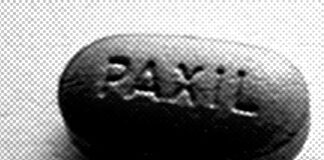Tag: antidepressants and violence
Brain Stew: An Interview with Myself
To this day not a single doctor, psychiatrist, psychologist, or any other professional has ever even suggested to me that psych meds could potentially be a contributing factor to violence or homicide.
Withdrawal Psychosis and the Aftermath of Tragedy
I wake to what has happened every day, and must filter my every action through the memories and the fallout of what I did when I was psychotic as a twenty-four-year-old kid.
Study Finds SSRIs Associated with Increased Risk for Violent Crime
Study finds an apparent connection between SSRIs, the most commonly prescribed type of antidepressant, and increased risk of violent crime.
Prescripticide: A Proposal for Action and a Request for Your Help
The primary factor protecting psychiatry’s unwarranted power and authority is that it is perceived as shielding society from folks who are believed to be dangerous. It would seem, then, that one logical step toward reducing society’s trust in biological psychiatry would be to reveal the evidence of a significant correlation between the use of prescribed psychoactive drugs and the commission of violent acts against oneself or others.
Psychiatry and a Near Mass Shooting at Cornell
Nearly all perpetrators of mass violence have had some contact with psychiatry or related mental health services. The idea of giving more power and money to psychiatry to prevent violence is a great political talking point but it is disastrous for public health and safety. Psychiatry seems averse to recognizing violent patients but eager to give them violence-inducing drugs.
Is Society or Psychiatry to Blame for the “Seriously Mentally Ill”...
Adults in the U.S. diagnosed with “serious mental illness” die on average 25 years earlier than others. This is not controversial, as establishment psychiatry and its critics agree. What is controversial is who is to blame?
Antidepressants Increase the Risk of Suicide and Violence at All Ages
Although the drug industry, our drug regulators and leading psychiatrists have done what they could to obscure these facts, it can no longer be doubted that antidepressants are dangerous and can cause suicide and homicide at any age.
What’s the Harm in Taking an Antidepressant?
We know that all drugs have side effects. That’s just part of the deal right? But is it really possible that an antidepressant can cause a sane person to act like a cold-blooded criminal?
$11.9 Million Paxil Suicide Verdict: The Inside Story
The judicial system and the public are becoming increasingly aware of the hazards of psychiatric drugs, including their capacity to make people behave in ways that are harmful to themselves and others, and contrary to their past behavior and character.
Sadness: The Problem and The Solution
There is an ever-narrowing bandwidth of behavior that supports the dominant narrative in our culture today. We all need to act a certain way to protect the foundational beliefs of our time – that “science” has it all figured out, that rules keep us safe, and that it’s us vs. them (insert germs, terrorists, pests, and other “enemies”). But what are the consequences of this? What is this sadness and where does it go if we bandage our consciousness with business, medication, substances, or general avoidance of our real human experience?
Violence Caused by Antidepressants: An Update after Munich
The media is now reporting details about the 18-year-old who shot and killed nine and wounded many others before killing himself on July 22 in Munich. My clinical and forensic experience leads to a distinction among people who murder under the influence of psychiatric drugs. Those who kill only one or two people, or close family members, often have little or no history of mental disturbance and violent tendencies. The drug itself seems like the sole cause of the violent outburst. On the other hand, most of those who commit mass violence while taking psychiatric drugs often have a long history of mental disturbance and sometimes violence. For these people, the mental health system seems to have provoked increasing violence without recognizing the danger.
Rising Rates of Suicide: Are Pills the Problem?
If you’ve read recent reports that state “US suicide rates surge to a 30 year high,” you might first justify the reality with the fact that things feel very wrong in our world today. On a personal, national, and planetary level, people are suffering to survive and the distress is coming from all sides – medical to economic to existential. But you probably also wonder why more people are choosing this permanent and self-destructive path, and feel compelled to submit to seemingly logical appeals to provide these individuals more help and greater access to treatment. Surprise: that may be the last thing our population of hopeless and helpless needs. Life’s inevitable challenges are not the problem. It’s the drugs we use that are fueling suicide.
Moving Forward in the Science of Psychiatric Medication Discontinuation/Reduction
This week Live & Learn launched a research study on the experience of people labeled with mental disorders who have tried to stop taking psychiatric medications. This project -- the Psychiatric Medication Discontinuation/Reduction (PMDR) Study -- aims to understand the process of coming off psychiatric medications in order to better support those who choose to do so. The study seeks to answer the question: What helps people stop their psychiatric medications? What gets in the way of stopping?
Prescribing Antidepressants for Girls: Intergenerational Adverse Consequences
Children exposed to SSRIs during pregnancy, a recent study shows, were diagnosed with depression by age 14 at more than four times the rate of children whose mothers were diagnosed with a psychiatric disorder but did not take the medication. Such reports are usually met, appropriately, with an outpouring of reassurances from clinicians who take care of pregnant women, who need to protect their emotional wellbeing in whatever way they can. From my perspective as a pediatrician specializing in early childhood mental health our attention must be on prevention.
Who Will Guard the Guardians of Psychiatry?
The assertion that the so-called antidepressants are being over-prescribed implies that there is a correct and appropriate level of prescribing and that depression is a chronic illness (just like diabetes). It has been an integral part of psychiatry's message that although depression might have been triggered by an external event, it is essentially an illness residing within the person's neurochemistry. The issue is not whether people should or shouldn't take pills. The issue is psychiatry pushing these dangerous serotonin-disruptive chemicals on people, under the pretense that they have an illness.
“The Hidden Harms of Antidepressants”
In a new article for Scientific American, Diana Kwon reports on how the true risks for suicide and aggression in children and teens taking...
The Evidence-Based Mind of Psychiatry on Display
The writings of Pies and his colleagues, I believe, provide a compelling case study of cognitive dissonance. Cognitive dissonance arises when people are presented with information that creates conflicted psychological states, challenging some belief they hold dear, and people typically resolve dissonant states by sifting through information in ways that protect their self-esteem and their financial interests. It is easy to see that process operating here.
Making the Case Against Antidepressants in Parliament
On Wednesday, May 11, there will be an inquiry by a work group in the U.K.’s Parliament into whether increases in the prescribing of antidepressants are fueling a marked increase in disability due to anxiety and depression in the U.K. I wrote about a similar rise in disability in the United States in Anatomy of an Epidemic, and the All Party Group for Prescribed Drug Dependence, which is the Parliamentary group that organized the debate, asked me to present the case against antidepressants.
Legal Journal Says Antidepressants Can Cause Violence and Suicide
Antidepressants have been reported to cause a state called “akathisia,” where people feel extremely agitated and restless and may become preoccupied with thoughts of...
Beneath the Fog
The medication left me emotionally numb, making it impossible to connect with people or sense the aliveness of the world around me. But after two years on antidepressants, I found something that gave me jolt of feeling strong enough to wake me up for a moment. I then spent the next seven years giving myself daily doses of horror to induce an emotional reaction.
GSK to Face Class Action over Antidepressants for Children
A Sydney, Australia law firm has launched a class action on behalf of people who as children and adolescents were prescribed Glaxosmithkline's drug Paroxetine. Despite...
Antidepressant Made Germanwings Co-pilot “Panic”
Germanwings pilot Andreas Lubitz wrote, in a desperate, final email to his psychiatrist two weeks before slamming his A320 jet into the French Alps...
“Is It Her Hormones?” A Case of Psychiatry Missing the Mark
The case of “Beth” depicts, almost innocently, the trials and tribulations of a well-adjusted, talented 15-year-old who developed depression, paranoia, panic attacks, and self-injurious and homicidal behavior, and “bipolar disorder” after being prescribed antidepressants, and then antipsychotics. After Beth decided - on her own - to discontinue psychotropic medications in favor of hormone therapy, she remained free of psychiatric symptoms.
Further Evidence of the Adverse Effects of Antidepressants, and Why These...
When the idea that selective serotonin re-uptake inhibitors (SSRIs) might make people feel suicidal first started to be discussed, I admit I was sceptical. It didn’t seem to me the drugs had much effect at all, and I couldn’t understand how a chemical substance could produce a specific thought. Because these effects did not show up in randomised controlled trials, they were dismissed and few efforts were made to study them properly. Then some large meta-analyses started to find an association between the use of modern antidepressants and suicidal thoughts and actions, especially in children.
Largest Meta-Analysis of Antidepressants Finds Doubled Risk of Suicide in Youth
The largest-ever meta-analysis of antidepressant trials appeared yesterday in the British Medical Journal. Researchers from the Cochrane Collaboration reviewed 70 trials (involving 18,526 subjects), to find that - counter to the initially-reported findings - antidepressants doubled the risk of suicide and aggression in subjects under 18. This risk had been misrepresented in the original study reports, the authors say, and suggest that the risks to adults may be similarly under-reported.



















